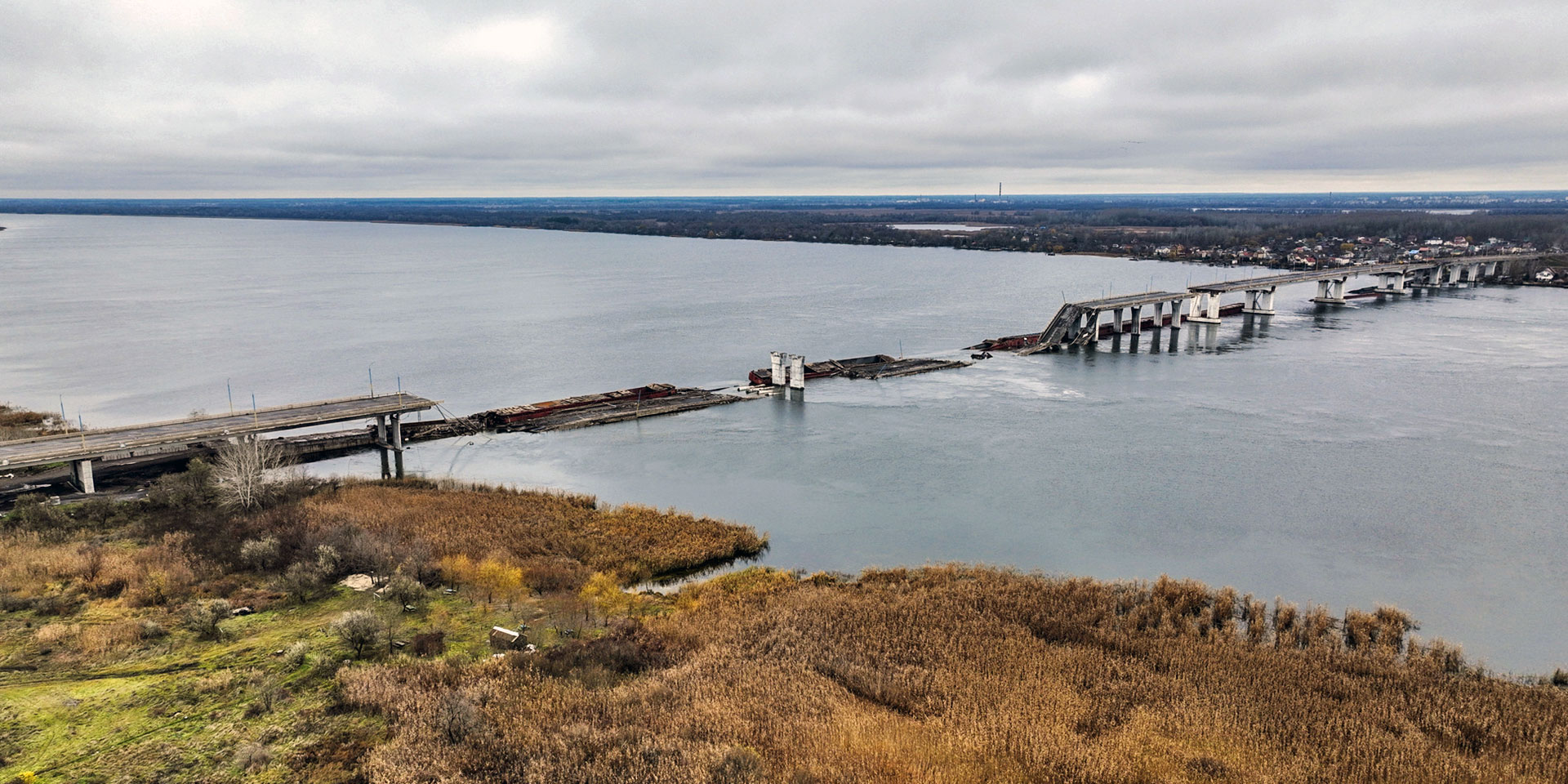News on the Summit on Peace in Ukraine
On 15 and 16 June 2024, Switzerland organised a Summit on Peace in Ukraine at the Bürgenstock. The aim of the summit was to develop a common understanding of a possible path to a just and lasting peace in Ukraine. All news on the summit can be found here in the ticker.
Replays
Here you find the key moments of the Summit on Peace in Ukraine at the Bürgenstock as replay.
94 States and organisations approve the Joint Communiqué at the end of the High-Level Conference on Peace in Ukraine
A vast majority of the States and organisations taking part in the High-Level Conference on Peace in Ukraine supported the Joint Communiqué.
In her closing speech, President of the Confederation Viola Amherd described the Joint Communiqué as “a clear signal to the people of Ukraine and to all those directly affected by the consequences of the war. A large part of the international community has the desire to bring about change.” The discussions over the past two days have shown that there are different points of view. “All the more important is our understanding that the path towards peace in Ukraine must be pursued – on the basis of international law and, in particular, the United Nations Charter”, said the President of the Swiss Confederation.
Closing address by President Viola Amherd at the Summit on Peace in Ukraine
31.10.2024 – In Montreal, Ignazio Cassis stresses human dimension on road to peace in Ukraine
On 30 October 2024, Federal Councillor Ignazio Cassis, head of the FDFA, took part in the Ministerial Conference on the Human Dimension of Ukraine's 10-Point Peace Formula. This meeting in Montreal concludes the series of follow-up conferences announced in June 2024 at the Bürgenstock resort. During the conference, Mr Cassis held political discussions with Canadian Foreign Minister Mélanie Joly, Ukrainian Foreign Minister Andrii Sybiha and Norwegian Foreign Minister Espen Barth Eide.
12.08.2024 – Joint declaration by Switzerland and Italy
During their meeting on the Brissago Islands in Ticino, Federal Councillor Ignazio Cassis and Italian Foreign Minister Antonio Tajani signed a joint declaration in which they reaffirm that Switzerland and Italy will remain in close contact to jointly create the best possible conditions for a second peace summit involving the parties, including Russia, and all interested global players. To this end, they have invited the international players to spare no effort to arrive at a common negotiating platform based on respect for international law and the principles of territorial integrity and independence of states enshrined in the UN Charter.
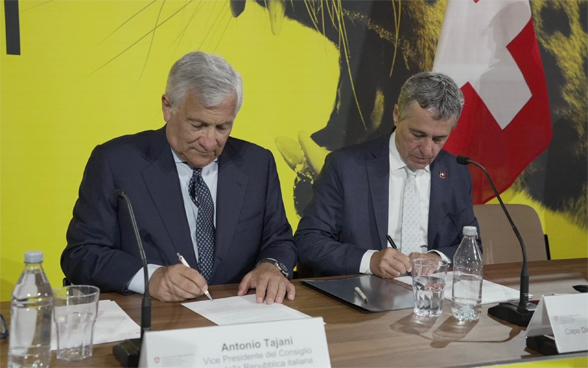
Mr Cassis thanked Mr Tajani and Giorgia Meloni, the Italian prime minister, for taking part in the Summit on Peace in Ukraine at the Bürgenstock resort, which enabled the first steps towards a peace process to be taken.
Joint Declaration by Switzerland and Italy on Ukraine (PDF, 1 Page, 148.5 kB, Italian)
11.07.2024 – UN General Assembly adopts resolution for the protection of nuclear facilities in Ukraine
The UN General Assembly has adopted a resolution reiterating the need to preserve nuclear safety in Ukraine and in particular the Zaporizhzhya nuclear power plant. The resolution was submitted by Ukraine to vote. Switzerland voted in favour of the resolution in New York. It is in line with Switzerland's long-standing commitment to nuclear security and the Summit on Peace in Ukraine at the Bürgenstock.
The resolution calls on the parties to the conflict to fully implement the five principles of the International Atomic Energy Agency (IAEA), which contribute to the protection of the Zaporizhzhya nuclear power plant. The Director General of the IAEA, Rafael Mariano Grossi, presented these principles to the UN Security Council on 30 May 2023 under the chairmanship of Federal Councillor Ignazio Cassis. They read as follows:
- no attacks of any kind from or against the nuclear power plant;
- no storage or stationing of heavy weapons or military personel at the plant;
- no threat to the offsite power supply;
- protection of all systems necessary for safe operation against attacks or acts of sabotage;
- no action that undermines these principles.
The text of the resolution also calls on Russia to immediately cease its military aggression and completely withdraw its troops from the internationally recognised territory of Ukraine. In addition, the Zaporizhzhya nuclear power plant should be returned to Ukrainian control to allow the IAEA to safely and effectively verify the safety and security measures of the nuclear power plant.
The resolution calls on all parties to the conflict to strictly comply with international humanitarian law and recalls that attacks must not be directed against civilians or civilian objects and that nuclear power plants enjoy special protection. The risks posed by a nuclear power plant incident in a war zone threaten the civilian population in Ukraine and other countries. Their protection must be a top priority.
The Bürgenstock Communiqué, agreed by a majority of participating states during the Summit on Peace in Ukraine, states that any use of nuclear energy must be safe and secure and that Ukrainian nuclear facilities must be under the full control of Ukraine in accordance with the principles of the IAEA. This key element, which was defined at the Bürgenstock alongside two others as a foundation for building trust and a future peace process, is mentioned in the General Assembly resolution.
18.06.2024 – UN Security Council: Dialogue on peace in Ukraine must continue after the Bürgenstock summit
At the UN Security Council meeting on Ukraine, Switzerland underlined the goal of last weekend's Summit on Peace in Ukraine: "We must have the courage to build peace. And to do this, we need to talk about it."
In the Security Council, Switzerland thanked the 101 delegations who met on the Bürgenstock to inspire a peace process in Ukraine. The intensive dialog at the highest level enabled a better understanding of the positions of the delegations from all regions of the world in order to promote a common vision for a just and lasting peace based on the UN Charter and international law. The Bürgenstock Communiqué, which is supported by a large majority of participating states and delegations, reflects this vision and sets out three key objectives:
- the safe and secure use of Ukraine's nuclear power plants and the inadmissibility of any threat or use of nuclear weapons;
- the unhindered transportation of agricultural products across the Black Sea to improve food security;
- all prisoners of war must be released as part of a comprehensive exchange. All Ukrainian children who have been unlawfully deported and displaced, as well as all other unlawfully detained Ukrainian civilians, must be returned to Ukraine.
Switzerland emphasized in the Security Council that these issues are suitable for building trust. However, peace can only be achieved if all parties are committed and engage in dialog. "Switzerland remains a partner for peace and dialog. It is necessary to continue this commitment beyond this first conference," emphasized Switzerland in New York.
Statement by Switzerland on a peace process in Ukraine, 18.06.2024
17.06.2024 – List of participating states and organisations
The list of participating states and organisations of the Summit on Peace in Ukraine, as of 17 June, can be found under the following link:
16.06.2024 – Press conference by President Amherd and Swiss Foreign Minister Cassis
16.06.2024 – Closing Press Conference: broad support for joint communiqué
President of the Swiss Confederation Viola Amherd and Ukrainian President Volodymyr Zelenskyy, together with leaders from across the globe – President Nana Akufo-Addo of Ghana, European Commission President Ursula von der Leyen, President Gabriel Boric Font of Chile, and Canadian Prime Minister Justin Trudeau – share their perspectives on the outcome of the Summit on Peace in Ukraine.
16.06.2024 – Highlight video
Key moments from the Summit on Peace in Ukraine.
15.06.2024 – Family photo
The aim of the 100 delegations on the Bürgenstock is to initiate a process for a lasting and just peace.
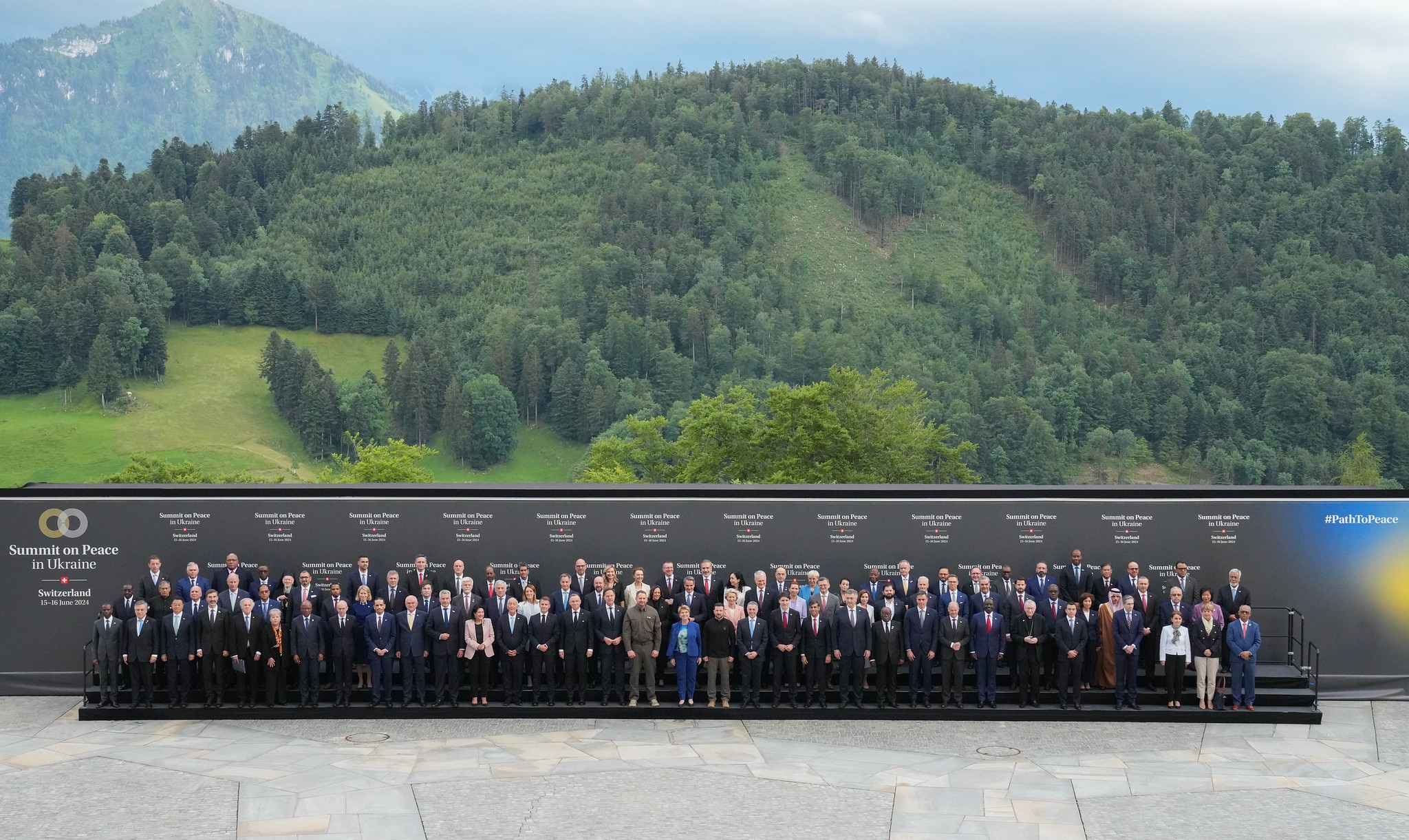
15.06.2024 – Press statements by President Amherd and President Zelenskyy
15.06.2024 – Opening address by the President of the Confederation Viola Amherd
President of the Confederation Viola Amherd opened the plenary session of the Summit on Peace in Ukraine.
14.06.2024 – President Amherd and Federal Councillor Cassis arrive on the Bürgenstock
President of the Confederation Viola Amherd and Federal Councillor Ignazio Cassis arrived at Bürgenstock. The federal councillors toured the site and were able to see for themselves how preparations for the summit were progressing.
With the participation of 100 delegations from all regions of the world, the aim of the summit is to initiate a peace process. A difficult but necessary task after more than two years of war and thousands of deaths.
14.06.2024 – Switzerland receives 100 state guests for Summit on Peace in Ukraine
President Viola Amherd will open the summit on peace in Ukraine on Saturday, 15 June. 100 delegations will attend the summit, including 57 heads of state and government from around the world.
The Swiss delegation incudes President Viola Amherd, head of the Federal Department of Defence, Civil Protection and Sport (DDPS), and Federal Councillor Ignazio Cassis, head of the Federal Department of Foreign Affairs (FDFA). Prior to the start of the summit, President Amherd will hold bilateral talks with Ukrainian President Volodymyr Zelenskyy. The summit itself begins with the arrival of the state guests early on Saturday afternoon and runs until Sunday afternoon.
The aim of this summit is to initiate a peace process. To achieve this, several elements are necessary: the broadest possible level of participation as a signal of support, the development of a common understanding on three topics that lend themselves to building trust, namely nuclear safety, food security and the humanitarian dimension, and set out a vision for the next steps in which Russia is included.
The summit also offers the opportunity to discuss for the first time at the highest level how and when Russia can be included in this process. For the Federal Council, the development of a lasting solution ultimately requires the participation of both sides. By organising this summit, Switzerland is enabling a first step that should trigger a process towards a just and lasting peace in Ukraine. As such Switzerland is continuing its long tradition of promoting dialogue.
13.06.2024 – Final preparations
The final preparations for the Summit on Peace in Ukraine on the Bürgenstock are in full swing.
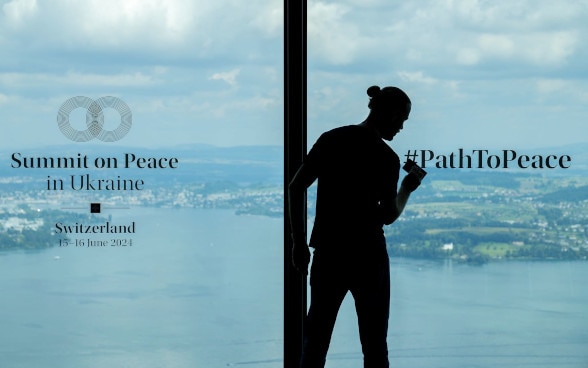
Images of the event will be made available on Flickr. These images may only be used for editorial purposes.
12.06.2024 – How is the Summit on Peace in Ukraine prepared? Communication
How can we ensure that the world can experience in real time what will be happening at the Bürgenstock? This is one of the many challenges facing the FDFA's communications: 360-degree communication to ensure a global impact. From raising awareness among the public – via the media, social networks and our website – to defining the entire visual identity of the summit, which must reflect the image of Switzerland, find out how the communication aspect of the preparations for the summit is being deployed in practice. In the face of misinformation surrounding the conference, factual, objective and transparent coverage is also essential.
11.06.2024 – Three topics selected for initiating a peace process at the Bürgenstock
On 16 June, three thematic sessions will be dedicated to aspects that are crucial for the start of a sustainable peace process in Ukraine. Food security, particularly for the countries of the Global South, nuclear safety and security and various humanitarian issues will be at the centre of the discussions. Free navigation on the Black Sea will also be a topic, as it is an indispensable prerequisite for the export of food between the breadbasket of Europe and the countries of the Global South.
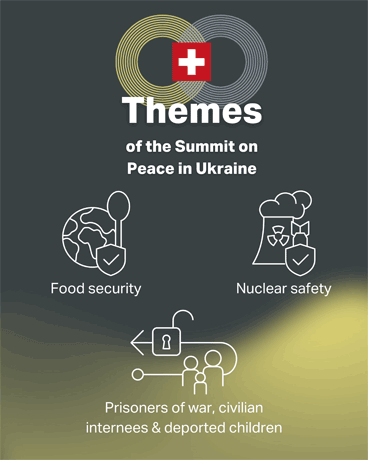
Food security
The production and export of agricultural products has been severely affected by the war. Many fertile soils intended for agriculture and Ukrainian production sites have been directly impacted by military operations. Mines, unexploded ordnance or suspicious objects pose an immense risk to agricultural production. Against this backdrop, finding a political solution in Ukraine remains crucial to stabilising food prices on the world market. At the same time, several ships in the Black Sea have come under artillery fire. This is helping to drive up the already high cost of maritime transport and therefore the overall cost of food travelling through the region. Ensuring free and safe shipping on the Black Sea would not only strengthen food security in many low-income countries, but also restore stability in the region.
Nuclear safety and security
Nuclear safety in Ukraine means reducing the risk of an accident resulting from a malfunction or an attack on nuclear facilities. In this context, the issue of protecting the Zaporizhzhya nuclear power plant and its supply infrastructure, which has repeatedly been the target of attacks, is of crucial importance. Even though all of the power plant's reactors have been shut down since mid-April 2024, the situation in terms of nuclear safety and security remains fragile. Other nuclear power plants in Ukraine are also at risk due to the ongoing hostilities. Russia is urged to step up its engagement with the International Atomic Energy Agency (IAEA) and the Ukrainian authorities to ensure nuclear safety and security on the ground. By facilitating this process, a basis for lasting peace in Ukraine can be created.
Humanitarian aspects
All parties to conflict have obligations under international humanitarian law regarding the protection and treatment of persons deprived of their liberty, including prisoners of war, civilian detainees as well as internees. These issues are fundamental to peace negotiations and dealing with the past. When people disappear, it has a devastating impact on those who remain behind. These effects can even go beyond the family and affect entire communities. Working to clarify the fate of detained and missing persons is essential for the reconstruction of a country and a key prerequisite for achieving lasting peace.
10.06.2024 – How is the Summit on Peace in Ukraine prepared? Protocol
The FDFA's protocol ensures that diplomatic events run smoothly. This also applies to the Summit on Peace in Ukraine at the Bürgenstock. Watch the video to find out how the protocol proceedings of the summit are prepared.
10.06.2024 – Media conference on the status of preparations and security precautions for the summit
90 states and organisations have so far registered to attend the summit on peace in Ukraine at the Bürgenstock (NW) on 15/16 June. On 10 June, President Viola Amherd, Federal Councillor Ignazio Cassis and Nidwalden Cantonal Councillor Karin Kayser-Frutschi, together with Stephan Grieder, head of operations and chief of the Nidwalden Cantonal Police, and Major General Daniel Keller, Commander of Territorial Division 2, gave a briefing on the state of preparations and security measures.
08.06.2024
Switzerland welcomes the participation of Japanese Prime Minister Fumio Kishida in the Summit on Peace in Ukraine on the Bürgenstock.
07.06.2024 – How is the Summit on Peace in Ukraine prepared? Security
The Summit on Peace in Ukraine on the Bürgenstock is taking place in a context of strong international tensions. For this reason, extensive security precautions are being taken, with cantonal and federal police forces as well as members of the Swiss Armed Forces deployed. The presence of numerous heads of state and government is the greatest security challenge. They are protected by international law and Switzerland is legally obliged to guarantee their security.
07.06.2024 – Confederation to contribute to security costs
A major security operation is in place to ensure the safety of the event and the participants at the Summit on Peace in Ukraine. At its meeting on 7 June 2024, the Federal Council decided to consider the summit an 'extraordinary event' under the Federal Act on Measures to Safeguard Internal Security. This decision means the Confederation will cover 80% of the cost of security measures taken by the canton of Nidwalden on behalf of the Confederation.
06.06.2024 – How is the Summit on Peace in Ukraine prepared? Politics
Preparations for the Summit on peace in Ukraine are in full swing since January. In its role as host, Switzerland is setting the political agenda for the summit. The meeting will focus on three topics: Nuclear safety, food security and freedom of navigation, as well as humanitarian aspects. The latter includes the protection of civilians and the exchange of prisoners of war. These three topics were chosen because Switzerland is convinced that small, concrete steps can be taken in these fields to build trust.
In the preparatory phase, it is important that Switzerland carries this message to the world with one voice in order to mobilise a broad range of participants for the conference. The bilateral contacts of President Viola Amherd and Federal Councillor Ignazio Cassis with their counterparts and the work of all Swiss representations around the world play a key role in this. Over 80 countries have already confirmed their participation. More than half of them come from outside Europe.
06.06.2024
French President Emmanuel Macron will attend the Summit on Peace in Ukraine on 15 and 16 June, the Élysée Palace has announced.
05.06.2024 – Good offices: Switzerland is there when it’s needed
The organisation of the Summit on Peace in Ukraine on 15 and 16 June at the Bürgenstock is part of Switzerland's tradition of good offices. Over the past 70 years, Switzerland has proven time and again that it was there when a place was needed to advance peace negotiations, to set the course for such negotiations or to organise conferences aimed at stabilising the international world order and promoting peace. This also applies to the Summit on Peace in Ukraine: Switzerland facilitates a platform for dialogue to inspire a future process on peace in Ukraine.
What are good offices?
‘Good offices’ is a collective term for various crisis and conflict management tools in Swiss foreign policy, in particular
- The role of host for international conferences or high-level meetings
- The representation of foreign interests in a state
- Facilitation of dialogue or mediation in conflicts
The aim of good offices is to resolve differences and conflicts between and within states through political dialogue. Often, the mere attempt to keep channels of dialogue open is an important step towards preventing further escalation in a conflict and cushioning the consequences of disputes. Switzerland does not impose its good offices on anyone. It offers itself as a mediator or is requested by states or parties.
Switzerland's good offices are closely linked to its impartiality, neutrality and humanitarian tradition, as well as to its political and economic stability. Switzerland is therefore predestined to host important conferences, act as a mediator, support negotiations between conflicting parties or maintain contact as a protecting power between states that have broken off diplomatic relations. Switzerland is active worldwide. It works professionally and efficiently, usually discreetly behind the global political scenes.
Examples of significant conferences in Switzerland
1872: Alabama Claims
Switzerland first acted as mediator during the so called Alabama Claims in 1872. An international arbitration tribunal based in Geneva ordered Great Britain to pay a fine to the USA for supplying warships to the southern states during the War of Secession. In this way, Switzerland contributed to resolving the conflict at a legal level.
1954: Indochina conflicts
Between April and July 1954, Switzerland organised peace negotiations on the Indochina conflicts. High-ranking representatives of the USA, the United Kingdom, the USSR, France, the People's Republic of China, North and South Korea, Laos, Cambodia, Vietnam and Viet Minh took part and signed a ceasefire agreement in Geneva on 21 July 1954. Foreign Minister Max Petitpierre noted at the time that Switzerland was able to offer a favourable climate for discussion and work, which had strengthened the international position of Switzerland as a neutral state.
1961-1962: Algerian War
In 1961 and 1962, Switzerland acted as a mediator between France and Algeria in the final phase of the Algerian War. It facilitated open channels of communication between the parties to the conflict and played an important role in the negotiations for the ceasefire agreement in Evian (FR). The Algerian delegation stayed on Swiss soil at the time.
Détente in relations between East and West
When the Iron Curtain divided East and West, Switzerland made an important contribution to easing tensions between the two blocs and thus also to ending the Cold War. For example, the Helsinki Conference on Security and Cooperation in Europe (CSCE), the predecessor organisation of the OSCE, met in Geneva between 1973 and 1975. These meetings served as a platform for reconciliation and confidence-building between East and West. A summit meeting between then US President Ronald Reagan and Soviet President Mikhail Gorbachev took place in Geneva in 1985.
Good offices on Swiss soil to this day
Switzerland has continued its commitment in the field of good offices to this day. In 2002, for example, as a host and co-mediator, it was able to negotiate on the Bürgenstock a ceasefire in the Nuba Mountains in Sudan. Between 2008 and 2015, it was the host state for negotiations on the nuclear agreement between Iran, the five permanent members of the UN Security Council, Germany and the EU.
05.06.2024
Prime Minister Lawrence Wong announced Singapore's participation in the Summit on Peace in Ukraine via the social media platform X.
03.06.2024
Vice President Kamala Harris will attend the summit, announces the US Presidency.
03.06.2024 – Armed Forces begin their support mission
The Swiss Armed Forces are supporting the security measures for the Summit on Peace in Ukraine at the Bürgenstock. A large part of the troops will begin their deployment today. From 5 to 19 June 2024, up to 4,000 members of the armed forces will provide assistance services for security, surveillance, command support and logistics. The army is also stepping up its measures to safeguard air sovereignty.
31.05.2024 – Statement by the Chinese Ministry of Foreign Affairs
The FDFA has taken note of the statement by the Chinese Ministry of Foreign Affairs of 31 May in regard to the Summit on Peace in Ukraine organised by Switzerland on 15 and 16 June at the Bürgenstock. The Department acknowledges that China attaches great importance to Switzerland's organisation of the first summit on peace in Ukraine. Switzerland and China share the same principles regarding the organisation of a peace conference. It must allow a fair discussion of all peace plans, involve the entire international community, in particular the countries of the Global South, and involve Russia. With over 80 countries confirmed at the Bürgenstock conference, preparations for the summit to discuss the various peace plans in the presence of the international community are progressing well.
Switzerland notes that the conditions for China's participation have not yet been met, particularly as Russia is currently not involved in the Bürgenstock summit. For Switzerland, Russia's involvement in the peace process is also essential. The FDFA is working actively to involve Russia in the peace process.
24.05.2024 – 70 States and organisations have already confirmed their participation in the Summit on Peace in Ukraine
More than 70 confirmations of participation at Head of State and Government level and organisations have been registered so far. Half of the confirmations currently come from Europe and the other half from the rest of the world. 11 states have publicly announced their participation, including India, the President of the European Commission and Germany.
22.05.2024 – Military support and airspace restriction
At its meeting on 22 May, the Federal Council approved a temporary restriction on the use of airspace during the high-level conference on peace in Ukraine, which Switzerland will be hosting on 15 and 16 June at the Bürgenstock resort in the canton of Nidwalden. The Swiss Air Force will provide air policing and advanced air surveillance services. The Armed Forces will also set up a subsidiary support service to complement the security measures of the cantonal authorities.
22.05.2024
The Austrian Federal Chancellor Karl Nehammer will attend the summit.
21.05.2024 – Why the Bürgenstock?
The Summit on Peace in Ukraine will take place on 15 and 16 June 2024 on the Bürgenstock in Canton of Nidwalden. The Bürgenstock is located high above Lake Lucerne and far away from larger cities, thus offering various advantages for the organisation of the summit.
Among other things, the Bürgenstock has the infrastructure and experience to hold a summit of this size. The Bürgenstock has already hosted several peace conferences in the past. On 19 January 2002, for example, a ceasefire agreement for the conflict in the Nuba Mountains in South Sudan was signed on the Bürgenstock following negotiations under Swiss auspices.
10.05.2024
Justin Trudeau, Prime Minister of Canada, will attend the summit, as announced on X.
09.05.2024
The President of Moldova, Maia Sandu, the President of Ireland, Simon Harris, and the President of the European Commission, Ursula von der Leyen, announce their participation in the summit.
08.05.2024
German Chancellor Olaf Scholz and the Secretary General of the Council of Europe, Marija Pejčinović Burić, will take part in the summit, as announced on X.
07.05.2024
Via X, Finnish President Alexander Stubb, Latvian President Edgars Rinkēvičs, and Spanish Prime Minister Pedro Sánchez announced their participation in the Bürgenstock summit.
06.05.2024
Polish President Andrzej Duda informs via social media of his participation in the Summit on Peace in Ukraine.
02.05.2024 – Switzerland invites over 160 delegations to the Summit on Peace in Ukraine
10.04.2024 – Switzerland to host Summit on Peace at the Bürgenstock resort in June 2024
At its meeting on 10 April 2024, the Federal Council took note of the results of the exploratory phase of the Summit on Peace in Ukraine. The conditions are now in place for the summit to be able to initiate a peace process. The first step is to develop a common understanding among the participating states with a view to achieving a comprehensive, just and lasting peace in Ukraine. The summit is scheduled for June 2024 at the Bürgenstock resort in the canton of Nidwalden.
The summit aims to establish a forum for a high-level dialogue on ways to achieve a comprehensive, just and lasting peace for Ukraine in accordance with international law and the UN Charter. It aims to create a common understanding of a framework favourable to this objective and a concrete roadmap for the peace process.

